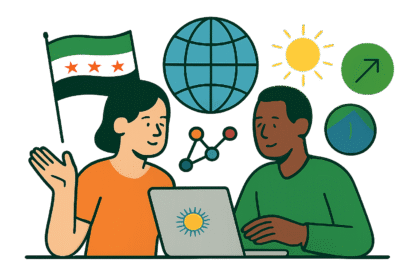
Rwanda’s Renewal: An Inspiring Success Story in Building Social Cohesion and a Digital Future from Scratch
- Rwanda’s experience offers valuable lessons on building social cohesion and reconstructing communities.
- The importance of good governance in achieving sustainable development.
- Rwanda’s investment in technology and innovation as a key to unlocking new horizons.
- Lessons learned can be applied in similar contexts like Syria.
Table of Contents
- Recovery Journey: From the Ashes of Genocide to Nation Building
- Good Governance: The Foundation of Sustainable Change
- Digital Future: From Scratch to a New Tech Hub
- Lessons for Insight Syria and the Syrian Context
- Challenges and Lessons for the Future
Recovery Journey: From the Ashes of Genocide to Nation Building
One cannot talk about Rwanda’s renewal without recalling the tragic memory of the 1994 genocide. In just 100 days, an estimated 800,000 people were killed, mostly from the Tutsi minority, along with moderate Hutus. The shock was profound, the destruction widespread, and the social fabric torn to pieces. In the aftermath of this catastrophe, Rwanda faced a monumental challenge: how to build a country from scratch, rebuild trust among a people torn by conflicts, and lay the foundation for a secure and prosperous future?
Case studies like Rwanda’s, which examine the shift from chaos to order, are crucial for understanding possible pathways. Under President Paul Kagame’s leadership, the Rwandan government demonstrated remarkable vision and political courage. Instead of drowning in the past, Rwanda chose to focus on the future, fully acknowledging its past. National reconciliation was the cornerstone of this process.
Building social cohesion in Rwanda wasn’t just a slogan; it was a well-thought-out and comprehensive strategy. Transitional justice mechanisms, like the Gacaca courts, a traditional community judicial system adapted to the scale of crimes, were activated. Despite criticisms faced, these courts played an important role in handling thousands of cases, enabling communities to begin a collective healing process, and confronting the perpetrators of genocide crimes. The goal was not only punishment but also acknowledgment of the victims and reintegration of offenders into society after serving their sentences—a complex process requiring precise data analysis to understand its social and psychological dimensions.
In addition to justice mechanisms, the focus was on enhancing a shared national identity, transcending the ethnic divisions exploited by the former regime. Kinyarwanda became the sole official language, alongside other languages like English, French, and Swahili, reflecting the country’s multicultural legacy. This move towards a unified national identity is a valuable lesson for societies suffering from similar conflicts.
Good Governance: The Foundation of Sustainable Change
No renewal process can succeed without a solid foundation of good governance. In Rwanda, the clear vision of leadership, commitment to combating corruption, and strengthening the rule of law formed essential pillars of revival. Government institutions were rebuilt on the foundations of efficiency and transparency, and ambitious national development plans were put in place.
“Vision 2020” was launched, a comprehensive development strategy aimed at transforming Rwanda from an agricultural country reliant on foreign aid to a modern state with a diverse economy oriented towards services and knowledge. This vision was bold and required precise market research to understand opportunities and challenges and long-term strategic planning.
The government focused on improving the business environment, simplifying procedures, and encouraging local and foreign investment. Rwanda became known as one of the easiest places to do business in Africa. This structural reform wouldn’t have been possible without precise data collection on investors’ needs and evaluating the effectiveness of applied policies.
Most importantly, good governance was reflected in the government’s ability to provide security and stability to its people. After years of violence, security became a top priority, and professional security forces capable of protecting both borders and citizens were built. This stability is a prerequisite for any successful case study in development and reconstruction.
Digital Future: From Scratch to a New Tech Hub
What distinguishes Rwanda’s story, in particular, is its bold investment in technology and a digital future from scratch. The Rwandan leadership recognized early that the digital economy is the key to development in the 21st century, and that investment in digital infrastructure and technological skills can compensate for the lack of natural resources.
Rwanda began building modern communication networks, expanding internet access, and encouraging the use of technology in various sectors. Initiatives like “One Laptop per Child” were launched to enhance digital literacy among young people. The capital Kigali became an increasing hub for technological innovation, attracting startups and developers.
Case studies from other countries in Africa and elsewhere have shown the importance of adopting technology as a tool for leapfrogging traditional development stages. Rwanda benefited from these lessons, focusing on financial technology (FinTech), smart agriculture, and digital education.
In-depth market research on technology market needs and global trends assessment was pivotal in guiding investments. Data analytics helped identify promising sectors and measure the impact of technological initiatives.
Today, Rwanda is considered a favorite destination for international technology conferences and events. It hosts summits on innovation and attracts technological talent from around the world. This remarkable transformation, from a war-torn country to an emerging technology hub, is a testament to forward-looking vision and strategic investment in a digital future.
Lessons for Insight Syria and the Syrian Context
Rwanda’s experience offers essential lessons for our work at Insight Syria, especially in understanding the challenges facing communities like Syria. In our context, we acknowledge the depth of the humanitarian crisis, the destruction of infrastructure, and the social fractures left by years of conflict.
Case studies like Rwanda’s help us build analytical models to understand how to rebuild trust, enhance reconciliation, and drive development in post-conflict communities. Focusing on building social cohesion is crucial and requires a deep understanding of transitional justice mechanisms, the role of civil society, and the importance of involving all parties.
Our expertise in market research and data analysis enables us to provide valuable insights to governmental and non-governmental organizations working on reconstruction and development in Syria. We can help with:
- Needs assessment: Conducting comprehensive field surveys to understand community needs in various sectors (health, education, livelihoods, housing).
- Impact measurement: Evaluating the effectiveness of reconstruction programs and humanitarian aid to ensure the best outcomes.
- Public opinion analysis: Understanding public perceptions on reconciliation, reintegration, and governance issues.
- Strategy development: Building data-driven strategies to support sustainable development efforts.
Pursuing good governance in Syria, as in Rwanda, requires ongoing efforts to enhance transparency, combat corruption, and build strong and accountable institutions. Opinion research can play a role in measuring the level of trust in institutions and identifying priority areas for reform.
For a digital future, the challenges in Syria are significant, but so are the opportunities. Technology can be harnessed to enhance education, provide new livelihoods, and improve services. This requires data collection on available digital infrastructure, technological skill levels, and identifying sectors where technology can make the biggest difference.
Challenges and Lessons for the Future
Rwanda’s journey was not easy, facing significant challenges along the way. There was debate about the government’s approach in focusing on security and economic development at the expense of some political freedoms. However, many argue that the stability achieved by Rwanda was essential for enabling any social or economic progress.
Case studies of societal transformation often involve complex trade-offs. Our role as experts in data analysis is to provide a clear picture of these trade-offs and enable decision-makers to understand the implications of their choices.
Building social cohesion requires continuous efforts, wide community engagement, and strong institutions. Building a digital future demands massive investments in education and infrastructure and a long-term vision.
At Insight Syria, we believe that understanding success stories like Rwanda’s renewal and analyzing its key factors can provide a valuable roadmap for communities seeking recovery and rebuilding. We are committed to applying this knowledge, along with our local expertise, to support efforts to build a better future in Syria. Providing high-quality market research services, data analysis, and opinion surveys is our way of contributing to this noble goal.
Rwanda’s story is one of hope, a testament that rebuilding is possible, and communities can rise from the darkest of circumstances to become stronger and more prosperous. It is a story we continue to study and apply its lessons to serve the development goals in our region.



